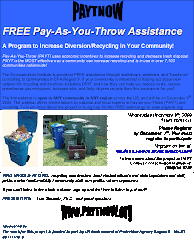At the beginning of the year, PSN highlighted a number of steps states and communities could take to ease the foreclosure crisis. At the time, a few communities had adopted what we called "You Foreclose on it, You Maintain it" policies to prevent banks and others taking control of properties from letting homes decay, bringing down community property values for remaining property owners.
As a Wall Street Journal article this week details, more than sixty communities are adopting similar policies, including stiff fees on companies responsible for vacact properties. California has passed the toughest law in this regard, empowering local governments to impose a $1,000-a-day fine on financial institutions that fail to maintain vacant properties if problems aren't fixed within 14 days.
The new law allows cities "to go in, abate the problem and tack [the cost] on to the tax bill" without having to enact a local ordinance, said California state Sen. Don Perata, the bill's sponsor.
Providence, R.I., enacted a "vacant property penalty" that allows the city to assess a fine equal to 10% of assessed property value if a vacact property becomes a blight on the neighborhood. Cincinnati has stepped up enforcement of its existing ordinance and collected about $192,000 in fees so far this year.
The key is that such policies not only help preserve communities but give lenders incentives to not foreclose in the first place, encouraging them to work out arrangements with the original owners who will then maintain the properties.
You Foreclose on it, You Maintain it
Requiring banks and other homeowners to upkeep foreclosed property is essential to containing the effects of the subprime foreclosure crisis. The Center for Responsible Lending study cited earlier, found a "spillover effect": a decline in property values in houses that were one eighth of a mile from a foreclosed subprime property. Not surprisingly, lack of upkeep on foreclosed homes brings down the overall appearance, and property value, of the area surrounding the foreclosed home.
In Buffalo, NY, city prosecutors hold banks responsible for fixing peeling paint, broken masonry, and overgrown or trash-filled yards at houses that the banks have foreclosed. Alternatively, the city may try to get lenders to donate properties to community groups or pay for demolition when the houses are beyond repair. City Prosecutor Cindy Cooper says, "At least in Buffalo, the days are gone when you can do a foreclosure and walk away without taking care of the property."
In an example of legal genius and, more importantly, courage, city prosecutors and judges have interpreted a 2004 New York statute that amended the definition of "owner" in its property maintenance code to include those that had "control" over the premises. Once banks send letters to defaulting homeowners threatening eviction, they have begun to assert "control" over the property, and are therefore responsible under New York code. The measure began to get the notice of banks when Judge Henry Nowak began entering default judgments for code violations and imposing the maximum fine, which can reach $10,000 to $15,000. While that may not be much for a big bank, the fines give the city a lien that impedes the banks' ability to buy or sell other properties in the area. Further, when lenders come to Judge Nowak's court to get residents evicted, he refuses to grant the request until the bank addresses the outstanding violations on the property.
Other jurisdictions have explicitly required upkeep on foreclosed properties. The Manteca, CA city council approved foreclosure upkeep rules that require homeowners to keep up foreclosed properties after tenants have moved out. Homeowners that neglect their homes would be fined up to $1,000 a day. Also, homeowners are required to maintain yards outside homes built after 1993. If they don't, the city can hire contractors for the upkeep and pass the bill onto the owners.
Stateside Dispatch: http://www.progressivestates.org/dispatch































1 comment:
The information here is great. I will invite my friends here.
Thanks
Post a Comment